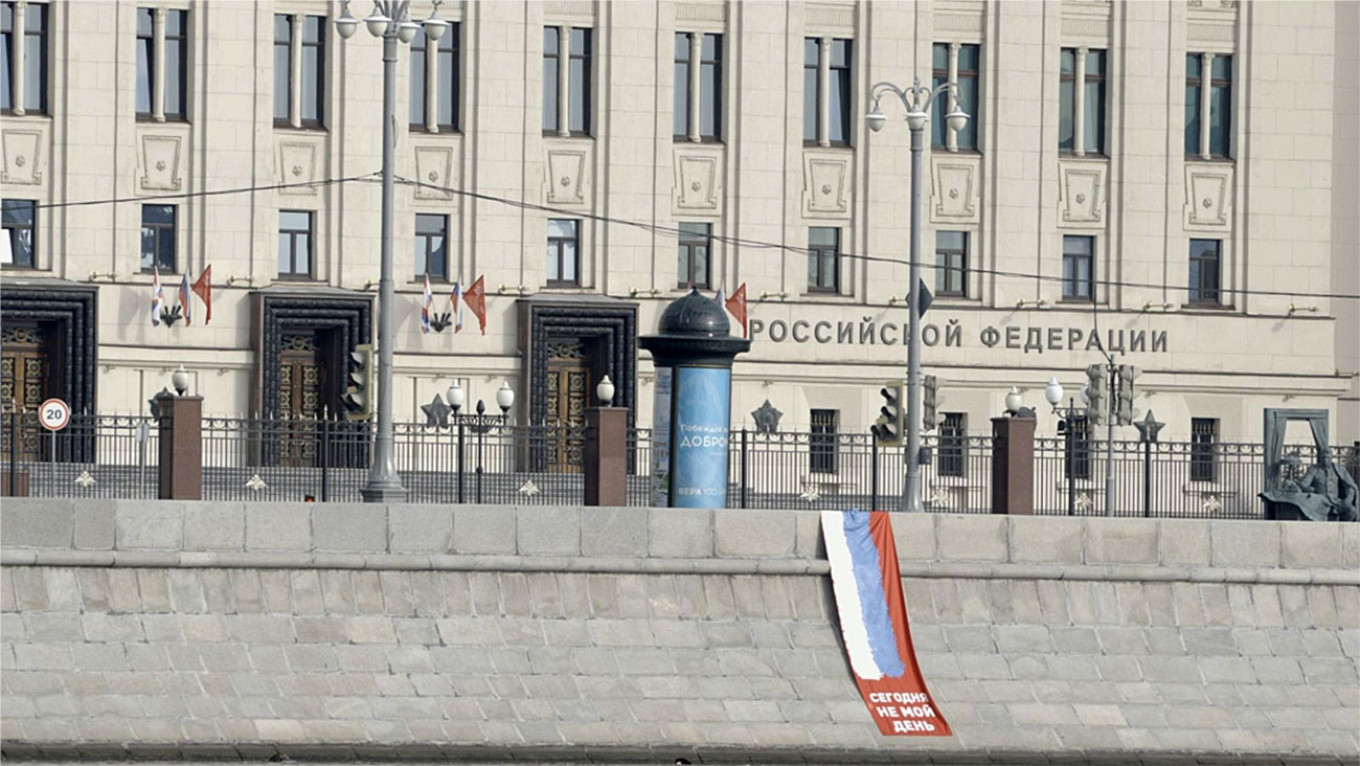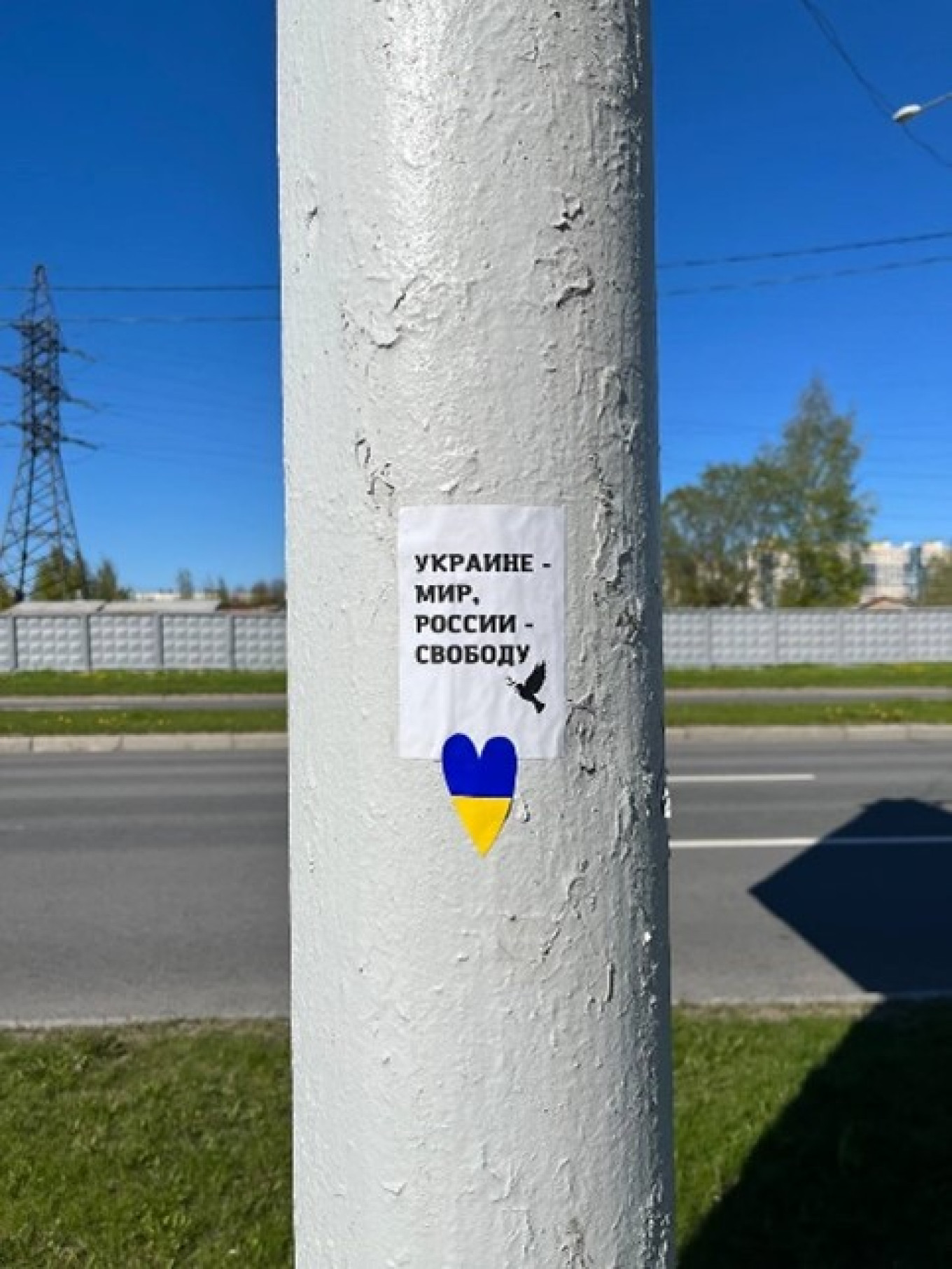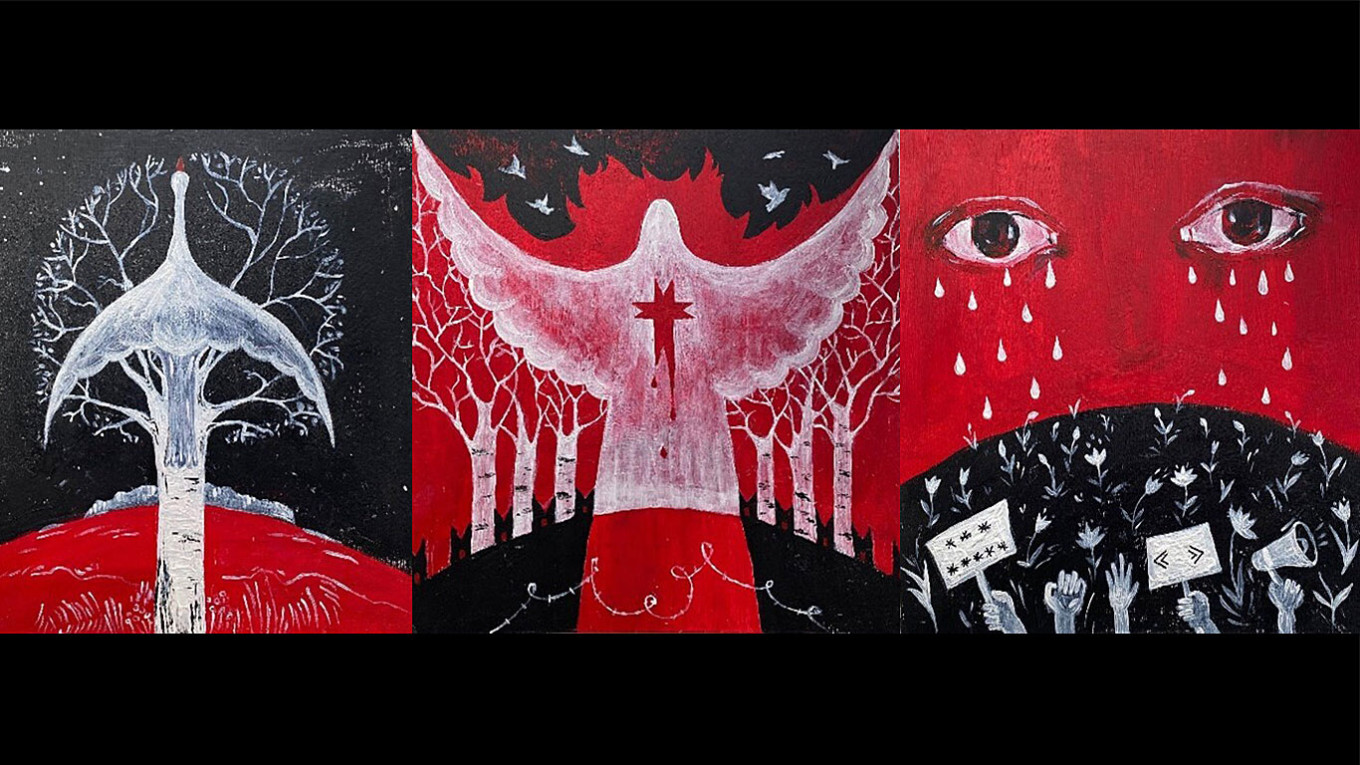In just six months Katya, a young Russian artist and anti-war activist, went from being unable to imagine leaving Russia to being forced into emigration.
“There isn’t anyone abroad to welcome me,” the artist and activist told The Moscow Times in August 2022. “And I don't want to fight [from another place]… when I’m here in Russia, I see that there are still people here who are against the war...”
But after the police knocked on her door for the third time in the middle of the night, Katya decided it was time to leave. “A relative persuaded me to leave as quickly as possible,” she wrote in February 2023, “otherwise I would have ended up in jail.”
The Moscow Times has been following four Russian artist-activists who are now living abroad. The three women artists, who are all in their 20s and 30s, wish to return and have chosen to remain anonymous. Denis Mustafin, 45, has applied for asylum in France and, if accepted, will renounce his Russian citizenship.

Katya’s art in Russia included working with textiles, a rethinking of traditional jewelry of ethnic minorities, painting and design. “I made feminist anti-war resistance graphic designs, but I also supported myself with my art,” she said. Her anti-war activities landed her in solitary confinement at the start of the war.
As a political artist, Denis Mustafin criticized Putin’s regime, government extremism, and political repressions through art installations, musical performances, group collaborations, video projects such as a film opposing the annexation of Crimea, and even running for office as a municipal deputy in the Zamoskvorechie district of Moscow in 2017. Like Katya, Denis was arrested for anti-war activities.
Yelena primarily painted and made graphics. In contrast with her pre-war work, “now I believe that my every gesture as an artist should carry an understanding of the catastrophe into which Russia has driven itself,” she said. She also participates in the Feminist Anti-War Resistance.
Masha is a transmedia artist whose work weaves sculpture and sound, painting and research, happenings and ceramics. She’s done large-scale installations, embroidered textiles and crafted rustic pots. She has produced anti-war stickers and posters, donated artworks to charity auctions to assist political prisoners and refugees and did small hand-poke tattoos in exchange for donations to a fund that helps Ukrainians.

Following her most recent arrest, Katya received unwelcome invitations: “One police officer kept calling me for a long time, inviting me to come with him to the bathhouse,” she said. “He photographed the address on my registration and told me that he would come to my place.”
Denis and a friend were arrested twelve hours after hanging a banner reading “today is not my day” on an embankment near Russia’s Ministry of Defense on June 12 — Russia Day. “Seven police officers detained me at my house,” he said.
“After that when I left the detention center, I began to look over my shoulder. Every time, leaving the entrance to my building, walking to my house, I look around like a spy... Are they waiting for me, is it an ambush, are there any strangers...it’s a kind of PTSD.”
He had also become accustomed to the freedom and enrichment of travel. But “every time you stand at passport control,” he said, “you worry and are not sure they’ll let you out.”

Work or stay
“If I wanted to remain an artist and continue to develop, I had to leave,” Yelena said. “It was clear that increasing fascism in public life in Russia would have a strong effect on artists.”
One of Yelena’s anti-war projects challenged the ideology behind the famed monument “The Motherland Calls.” It is an imposing figure of a woman in the Soviet Socialist style, one arm raised with sword outstretched, that symbolizes Russia’s previous victories.
Yelena believes the monument represents “the end justifies the means.” She and the other artists involved in the project “discussed the monument in relation to the Soviet and post-Soviet culture of motherhood… regarding narcissism and the belief that children owe something to their mothers and should make sacrifices if she calls for it,” she explained.
“It is difficult and bitter for me to think that my works will not be shown in Russia in the near future — after all, they are made for Russians,” she said. She is now studying in Germany.
Masha is not an ethnic Russian. In her work, she said, “I want to understand how to break the colonial tradition of severing the ties with authentic culture… My people underwent Russification a very long ago, but this didn’t make me Russian – rather, it made me neither one nor the other.”
Leaving Russia would allow her to exhibit her art without any censorship by Russian galleries that were “trying to be careful and not take anything too political,” she said.

Starting over
Most of the artists were encouraged to leave by their families, who were concerned about their safety regardless of their own political views. Some left for the sake of their own children and their future. None know how the change of location will affect their art.
A slight man who smiles infrequently, Denis stared when first asked what he lost upon leaving Russia. “I will probably be able to answer this in a year because now it seems to me, cynically, that I’m not losing anything,” he said.
Denis’s plans for new works shift as time passes. He applied for a grant to fund a film project but was rejected. “Now I understand,” he said, “that without a community, some kind of society, I cannot do anything alone, and I will need to keep living in a small city for some time. Here they do films, festivals, musical groups in teams, but now only individual practices are accessible to me.”
Denis practices his art in the streets and forests of Avallon, making geometric designs with rubber bands and tacks provided through the Agency of Artists in Exile. The agency has recently offered him candidacy for a two-month residency.

Masha is now in Tbilisi with her husband. “At first we had nowhere to go, so my partner found a job offer with a salary enough to support us.”
“We rent a small house with a garden,” she said. Masha is safely able to continue her work in Georgia. “In the garden, I set up a gallery where my friends and I are preparing an exhibition,” she said. She recently finished an artist’s residency, “a small study of colonial history and colonial politics in Siberia and Tatarstan, which I tried to express in my art.”
“We feel very good here. I would like to stay, but so far it’s impossible to get a residence permit. Probably because of having Russian citizenship, the war in Ukraine, the war in Georgia and subsequent occupation of 20% of the territory.”

Yelena feels cut off from her milieu, friends and professional contacts. “I lost the city where I grew up and was born,” Yelena said. “I lost the opportunity to live in my apartment, where I felt comfortable. I lost my usual way of life.”
But Yelena received a grant and is continuing to develop her art. “What is important here is that I have the opportunity to work in a different, new, unfamiliar but fundamentally free environment.”

Katya says she has now found some hope abroad. "When you are a woman with a background like mine,” she wrote, “you never know where the threat will come from tomorrow.”
“From a distance, things look different. I think that my forced emigration will only make what I create richer. Now I am focused on finishing all my projects and resting, because I haven’t had a rest for a very long time.”
A Message from The Moscow Times:
Dear readers,
We are facing unprecedented challenges. Russia's Prosecutor General's Office has designated The Moscow Times as an "undesirable" organization, criminalizing our work and putting our staff at risk of prosecution. This follows our earlier unjust labeling as a "foreign agent."
These actions are direct attempts to silence independent journalism in Russia. The authorities claim our work "discredits the decisions of the Russian leadership." We see things differently: we strive to provide accurate, unbiased reporting on Russia.
We, the journalists of The Moscow Times, refuse to be silenced. But to continue our work, we need your help.
Your support, no matter how small, makes a world of difference. If you can, please support us monthly starting from just $2. It's quick to set up, and every contribution makes a significant impact.
By supporting The Moscow Times, you're defending open, independent journalism in the face of repression. Thank you for standing with us.
Remind me later.







